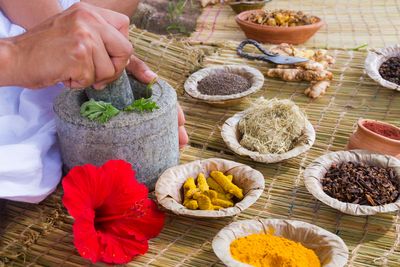IN EARLIER TIMES, traditional medicine and home remedies were often the quick-fixes for a baby that had suddenly fallen ill or was perennially crying. Of course, in some cases it worked like a charm. In most cases, nothing untoward happened to the babies.
In many of our homes, ora marundu or ghutti or suthu kaara is given to newborns to improve their general health and keep common ailments such as colic pain, cold and cough and constipation at bay.
Typically, it contains six to seven ingredients that are boiled in milk and then sun-dried. This process is repeated over a period of time. The resulting shrivelled bark or nut is then rubbed against a stone to obtain an extraction that is fed to the newborn. The cocktail of ingredients that make up this traditional medicine differs from one family to another, depending on their own recipe.
Commonly used ingredients are:
Thai galangal: Fights cold/ cough
Nutgall: Cleans the stomach
Sweet flag: Nourishing, and fights colic pain
Nutmeg: Induces sleep
Inknut: Helps fight constipation
Dry ginger powder: Aids digestion and fights cold and body ache
Whole turmeric: Antiseptic and fights cold
China root: Aids weight gain
Though the above ingredients contain herbs and spices commonly used in ayurveda, it also consists of ingredients such as nutgall that develops from eggs laid on leaf buds by insects (such as the agamic gall wasp).
Bottled versions of ghutti also include powder of flowers such as Cassia fistula and other seeds and pods. So it is important to understand that this mixture contains plant and animal byproducts, whose composition and effects haven’t been scientifically studied on newborns.
Most paediatricians insist that no intervention, allopathic or otherwise, is required as the so-called discomforts are part of an infant’s development. The first principle to be kept in mind, doctors say, is ‘do no harm’. Ayurveda practitioners themselves insist that overdose of any natural medicine can turn into poison in the body.
Many paediatricians I had interviewed for my first book―For Bumpier Times―also felt that such traditional medicines:
(i) relax muscles, wherein the child stops fidgeting and its body seemingly calms down. The tongue swells and turns sluggish. So the baby’s cries are slurred and it is unable to cry with usual shrillness or volume. (For instance, in wasp bites, the sting can cause a local spasm)
(ii) reduce intestinal motility, which is crucial for digestion of food and passing wind
(iii) push the child into a state of sluggishness or even sleep
(iv) can cause vomiting and constipation in some
Doctors say once the effect of the muscle relaxant wanes, the child is found to have a big, bloated abdomen. This is because bowel and wind movements were constricted. The crying resumes once the swelling of the tongue comes down.
Many families might credit the disappearance of colic pain to the prolonged use of ghutti or ora marundu but colic pain, left to itself, does end by the fourth month in most babies. Also, do note that if your paediatrician doesn’t endorse this traditional medicine, then you may hesitate to approach him or her if you observe any side-effects or little improvement in your child.
Next issue: Learning to wean


